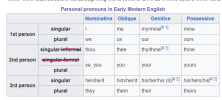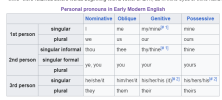One way to remind the audience that these events are taking place a long time ago is to choose our vocabulary carefully.
We will need to avoid certain words and turns of phrase as being too modern or anachronistic. But that is often a nuanced determination, rather than a straightforward rule.
Words that are too 'modern' will be jarring and out of place, sounding like the speaker is from our own culture rather than from an elven, dwarven, or Edain background. If a word rarely appeared in English prior to 1950, then likely it is too modern for the dialogue in Silm Film. But sometimes even an older word may sound or seem too modern. For instance, "nervous system" was first used in the 1730's, and yet when Gimli says that his axe is embedded in an orc's nervous system in Peter Jackson's The Two Towers, it seems anachronistic. Why would a dwarf know that the brain is connected to the rest of the body by nerves, and that it can cause the body to twitch after death? That does not feel like a body of knowledge that these characters would have (even though they very well could). Likewise, "menu" (in the sense of detailed list) has been in use since the 1650's, but "Looks like meat's back on the menu!" makes it seem as though orcs are familiar with the experience of ordering food in a restaurant....which seems ridiculous. Tolkien used deliberately anachronistic language in the Shire scenes (such as comparing fireworks to the sound of a locamotive in the description), but while we might think that the "eavesdropping" and "I wasn't dropping no eaves" exchange sounds anachronistic, the word "eavesdropping" goes back to the 1640's, and "eaves" itself is from Middle English and was in use by the 12th century. So, "too modern" is rather subjective at the end of the day. The best way to avoid this will be to rely on multiple proofreaders to catch words and phrases that sound 'off' and out of place in Middle-earth to them.
Another concern is to make the dialogue sound "Tolkienian". Does this sound like something one of J.R.R. Tolkien's character's would say? Does it seem plausible that he could have written this? This is, of course, extremely challenging. While there are a few "guidelines" concerning what words Tolkien would use in a given context, they're not hard and fast rules, and simply following them won't get the job done. Writing is an art, and Tolkien was a master artist in this medium. So, how to go about imitating him? We can't rely simply on a list of what to avoid, but rather must have some positive ideas of what to include as well.
We will need to avoid certain words and turns of phrase as being too modern or anachronistic. But that is often a nuanced determination, rather than a straightforward rule.
Words that are too 'modern' will be jarring and out of place, sounding like the speaker is from our own culture rather than from an elven, dwarven, or Edain background. If a word rarely appeared in English prior to 1950, then likely it is too modern for the dialogue in Silm Film. But sometimes even an older word may sound or seem too modern. For instance, "nervous system" was first used in the 1730's, and yet when Gimli says that his axe is embedded in an orc's nervous system in Peter Jackson's The Two Towers, it seems anachronistic. Why would a dwarf know that the brain is connected to the rest of the body by nerves, and that it can cause the body to twitch after death? That does not feel like a body of knowledge that these characters would have (even though they very well could). Likewise, "menu" (in the sense of detailed list) has been in use since the 1650's, but "Looks like meat's back on the menu!" makes it seem as though orcs are familiar with the experience of ordering food in a restaurant....which seems ridiculous. Tolkien used deliberately anachronistic language in the Shire scenes (such as comparing fireworks to the sound of a locamotive in the description), but while we might think that the "eavesdropping" and "I wasn't dropping no eaves" exchange sounds anachronistic, the word "eavesdropping" goes back to the 1640's, and "eaves" itself is from Middle English and was in use by the 12th century. So, "too modern" is rather subjective at the end of the day. The best way to avoid this will be to rely on multiple proofreaders to catch words and phrases that sound 'off' and out of place in Middle-earth to them.
Another concern is to make the dialogue sound "Tolkienian". Does this sound like something one of J.R.R. Tolkien's character's would say? Does it seem plausible that he could have written this? This is, of course, extremely challenging. While there are a few "guidelines" concerning what words Tolkien would use in a given context, they're not hard and fast rules, and simply following them won't get the job done. Writing is an art, and Tolkien was a master artist in this medium. So, how to go about imitating him? We can't rely simply on a list of what to avoid, but rather must have some positive ideas of what to include as well.
- Study the corpus. Sure, the dialogue of the published Silmarillion is limited. But it's a starting point. And luckily, we have access to the History of Middle-earth, and thus have much more substantial dialogue samples to use as the basis of our own writing. The "Athrabeth Finrod ah Andreth" is 24 pages long, and almost all dialogue. The "Statute of Finwë and Míriel" gives dialogue to many of the Valar. Unfinished Tales contains a letter written by High King Gil-galad to the King of Númenor. Etc. So we do have samples to base our writing on, and needn't invent everything from wholecloth.
- Give preference to words that were in use in the English language prior to the year 1200. These are some of the oldest words in English, and will sound foundational. Here's a helpful list of examples compiled by a dictionary:
https://www.merriam-webster.com/time-traveler/before 12th century
Once discarding the references to classical and religious topics, we are left with a sizable list of words to work with. Not sizeable enough to use exclusively, but certainly words that can be given a preference in our dialogue. There are also words on this list that a modern English speaker (or reader) has likely never encountered before. These are words that have gone out of modern usage. We have to be careful with those. Would Tolkien use them? For sure. Anyone who has read The Book of Lost Tales knows that Tolkien did not shy away from reintroducing old words to his writing. Difficult to get through that without help from a glossary, like having to read Shakespearean dialogue with footnotes. What's a 'bodkin'? Where would you find a 'fane'? One is from Hamlet, the other from Tolkien. But Lord of the Rings style writing does not include nearly so many of those. So, my advice would be to use such words very sparingly, and only if one could expect a listener in the audience to figure it out from context. Presumably, someone could deduce that 'fenny' means 'boggy,' even if they'd never heard that before, and we are certainly using the name the 'Fens of Serech'. Whereas the meaning of 'fere' would likely be opaque, not clearly indicating a companion or spouse, and should probably be avoided.
- University of Glasgow's Historical Thesaurus may come in handy if you're hunting for a slightly older, but still understandable version of a word:
https://ht.ac.uk/
So, as an example, 'outerwear' is introduced in 1928, so too modern for this project. Sounds like your characters are shopping at REI, not hanging out in Middle-earth. Naturally, you might think to say 'robes' when talking about generic long garments from the past, but this gives you other options, such as 'outer clothing' (1891), not a bad choice for hobbits. And then there's 'overclothing' (1425) for the older cultures. So, you can still get that concept of 'outerwear' without having to specify coat or cloak or whatever, but you can subtly avoid using the word 'outerwear,' and don't have to resort to something exotic like 'out-array' (1647).
Or a word like 'telepathy' (1882) might sound too technical and hence 'modern' to the audience as a translation of "osanwe-kenta", but there are a slew of other words that date from the exact same time period that might be more palatable, such as 'mind-reading' or 'thought-transfer'. 'Psychognosis' (1891) would make it worse, not better! Similarly, 'seer' (1661) is a much better choice than the nineteenth century 'clairvoyant' or 'medium' or 'second-sighter' (I did not make that up, promise!)
- University of Glasgow's Historical Thesaurus may come in handy if you're hunting for a slightly older, but still understandable version of a word:
- Give a strong preference to words that have their root origin in Old English/German, not French/Latin. Obviously, Tolkien's writing is not completely free from words of French/Latin origin, but he felt very strongly that the Norman Conquest of 1066 was a tragedy that destroyed the English language. So, whenever possible, he expressed a strong preference for these words.
Should a character be shy? Or timid?
Should a town be sleepy? Or complacent?
Should the enemy assault or beset someone?
Should the task be daunting or direful?
So when do we get to use the French/Latin origin words? When the meaning we want is too nuanced and must be differentiated. Or when the Old English variant is too obscure or awkward, and will obscure the meaning entirely. From the dictionary again:
Attack, assail, assault, molest all mean to set upon someone forcibly, with hostile or violent intent. Attack is the most general word and applies to a beginning of hostilities, especially those definitely planned: to attack from ambush. Assail implies vehement, sudden, and sometimes repeated attack: to assail with weapons or with gossip. Assault almost always implies bodily violence: to assault with intent to kill. To molest is to harass, to threaten, or to assault: He was safe, and where no one could molest him.
With the exception of "threaten", all of these words are of French (and ultimately Latin) origin. Sometimes, we will need to specify. Tolkien is the author of "Morgoth was not unassailable", so it's not like he limited himself to 'threaten' and 'beset', and was willing to use attack, assail, assault, harass as needed. And when is the last time you heard someone say "direful"? Whereas "daunting" will be clear and understood.
How are you to know whether a word is of French/Latin origin or Old English/German origin? If you aren't sure, you can look up its etymology in an online dictionary. This is clearly WAY too much work to do for every word choice while writing! But if something about a line isn't working, you can always look up one of the words, and, if it is from the French, look for a synonym that is from the Old English - then see if swapping them helps.
- Give preference to alliteration. Tolkien's poetry is full of alliteration, and use of similar sounds ("w" and "y" for instance, do not alliterate, but are related, in the same way that "n" and "m" are similar.) If you can get two to three leading consonants in a line to alliterate, your writing may sound more like it was written by Tolkien. No one can do this all the time, but doing more of it will help with the style associated with word choice.
- Avoid modern usages, regional slang, or anything that sets the dialogue firmly in a time/location in the modern world.
The clearest example of this is the greeting "hello" - this became common or popular after the invention of the telephone. Granted, it's from the earlier "hallo" which means something like "ahoy there!" so it's not strictly modern in origin. But in usage? Too modern. "Hullo, what's this?" as an exclamation of surprise is fine for hobbits. But "Hello, how are you?" has no place in our dialogue. We need greetings that are appropriate for these cultures. "Lo!" used to call attention or to express wonder or surprise would be a perfectly acceptable interjection. OK/okay is American slang from 1839-40, and there is no reason for it to exist in Middle-earth. No character in Silm Film is going to say "all y'all" or "yinz". They'll say "ye". Etc.
Last edited:



